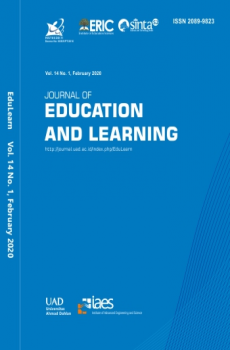
Journal of Education and Learning (EduLearn)
ISSN 2089-9823 (Print) | 2302-9277 (Online)
Accreditation: Sinta 1
Indexing: Sinta (Science and Technology Index)
Organizers: Universitas Ahmad Dahlan
Contact:
LPPI UAD
Email: lppi@uad.ac.id
Phone/Mobile: (0274) 563515
About the journal
The Journal of Education and Learning (EduLearn) (ISSN: 2089-9823; e-ISSN: 2302-9277) is a multi-disciplinary, peer-reviewed, open-access international journal that has been established for the dissemination of state-of-the-art knowledge in the fields of education, teaching, development, instruction, educational projects and innovations, learning methodologies, and new technologies in education and learning. EduLearn welcomes research articles from academics, educators, teachers, trainers, and other practitioners on all aspects of education and learning from around the world to publish high-quality papers. Papers for publication in this journal are selected through precise peer review to ensure quality, originality, appropriateness, significance, and readability. This journal encompasses a variety of topics in education and learning, including but not limited to child development, curriculum, reading comprehension, philosophies of education, STEM education, instructional technology, technology education, inquiry-based learning, project-based learning, problem-based learning, simulation-based learning, pedagogic and educational approaches, learning management, language teaching research, teaching and learning at all levels of schooling and institutions of higher learning, the education of special groups, gender and education, theories of education, educational research and methodologies, educational psychology (emotional, social, and cognitive learning processes), e-learning, computer-supported collaborative work, emerging technologies in education, educational software, educational games EduLearn is published by Intelektual Pustaka Media Utama (IPMU) in collaboration with the Institute of Advanced Engineering and Science (IAES) and Universitas Ahmad Dahlan (UAD). This journal is ACCREDITED (recognised) under SINTA 2 by the Ministry of Education, Culture, Research, and Technology, Republic of Indonesia (Decree No: 5162/E4/AK.04/2021) and is INDEXED by the ERIC Institute of Education Sciences (IES) of the U.S. Department of Education.
Aims and Scope
The aim of the Journal of Education and Learning (EduLearn), ISSN 2089-9823, e-ISSN 2302-9277 is to provide an international forum for the sharing, dissemination and discussion of research, experience and perspectives across a wide range of education, teaching, development, instruction, educational projects and innovations, learning methodologies and new technologies in education and learning. The focus and scope of EduLearn includes the following topics: • Career development and training in education and learning: entrepreneurship curriculum, internship programmes, lifelong learning, technology transfer, training educational staff, university-industry cooperation, vocational training, workplace training and employability issues, etc. • Experiences in education and learning: curriculum design and development, educational management, educational trends and best practice contributions, enhancing learning and the undergraduate experience, experiences in game based learning, higher education area: the bologna declaration and ects experiences, learning experiences in higher and further education, learning experiences in preschool education, pre-service and in-service teacher experiences, quality assurance/standards and accreditation, special education, stem in education, transferring skills and disciplines, etc. • Experiences in education and learning research: academic research projects, research methodologies, links between education and research, new projects and innovations, etc. • International projects in education and learning: new experiences for the international cooperation, project outcomes and conclusions, university networks, exchange programmes and erasmus experiences, the internationalization of universities, funding programmes and opportunities, etc. • Pedagogical innovations in education and learning: learning and teaching methodologies, evaluation and assessment of student learning, accreditation for informal learning, new learning/teaching models, neuroscience in education, language learning innovations, collaborative and problem-based learning, personalized learning, tutoring and coaching, flipped learning, etc. • General issues in education and learning: education and globalization, multicultural education, impact of education on development, planning digital-age school and learning spaces, organizational, legal, policy and financial issues, leadership in 21st century education , barriers to learning (age, psychosocial factors, ethnicity...), ethical issues and plagiarism in education, access to internet: advances and problems, diversity issues, women and minorities, student support in education, funding programmes and opportunities, etc. • Computer supported collaborative work: augmented reality, collaborative virtual environments (CVEs), community building, computer-mediated communication (CMC) tools, social & digital media in education, web 2.0 and social networking: (blogs, wikis...), web 3D applications and virtual reality, etc. • E-content management and development: digital identity management, digital libraries and repositories, e-portfolios, intellectual property rights, knowledge management, learning analytics, open access education, security and data protection, user-generated content, etc. • Educational software & serious games: animation and 3D systems, computer software on education, educational multimedia and hypermedia, educational software experiences, educational/serious games, gamification, gaming consoles as learning tools, videos for learning (YouTube generation), etc. • e-Learning: blended learning, distance learning, educating the educators, e-learning for environmental sustainability, e-learning standards (SCORM), e-learning projects and experiences, e-moderating, e-tutoring & mentoring, intelligent tutoring systems (ITS), learning management systems (LMs), managed learning environments (MLEs), massive open online courses (MOOCs), mobile learning, online assessment, online/virtual laboratories, personal learning environments (PLEs), training, evaluation and assessment, virtual learning environments (VLEs), virtual universities, etc. • Emerging technologies in education: advanced classroom technology, best practices in multimedia-based education, BYOD (bring your own device) and 1:1 learning, flipped classroom, ICT for development, ICT skills and digital literacy, mobile and tablet technologies, new platforms to teach coding skills (arduino, raspberry PI,...), technology-enhanced learning, the impact of web technologies on education, web classroom applications, etc.